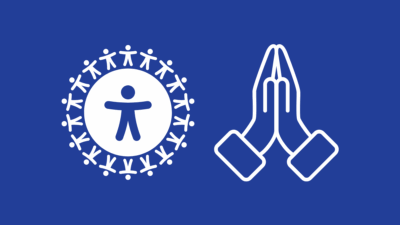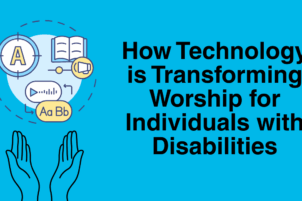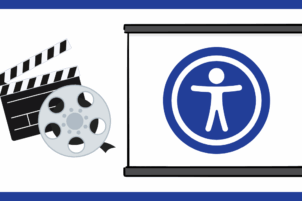 Community and belonging are central to many faith and spiritual traditions. Yet, people with disabilities face many barriers to access and inclusion. Addressing these barriers acts as a catalyst not just for participation, but for true belonging. Shifting the conversation from “can people with disabilities attend our worship services?” to “who is missing from our gatherings, and what would it take to make everyone feel seen, heard, and valued here?” demonstrates how accessibility can move beyond welcoming to create genuine belonging.
Community and belonging are central to many faith and spiritual traditions. Yet, people with disabilities face many barriers to access and inclusion. Addressing these barriers acts as a catalyst not just for participation, but for true belonging. Shifting the conversation from “can people with disabilities attend our worship services?” to “who is missing from our gatherings, and what would it take to make everyone feel seen, heard, and valued here?” demonstrates how accessibility can move beyond welcoming to create genuine belonging.
When people think about accessibility, physical features such as ramps, elevators, and accessible seating often come to mind. While these are critical, it’s important to recognize that not all disabilities are visible or physical. Expanding our understanding of accessibility and disability allows faith and spiritual organizations to better meet the full needs of disabled individuals.
Common barriers to accessibility include:
- Physical barriers prevent disabled people from entering, navigating, and fully utilizing buildings. Solutions include ramps, elevators, wide doorways, accessible bathrooms, and seating options.
- Digital barriers limit disabled people’s ability to engage with online spaces. Solutions include accessible website design, closed captioning, and ensuring websites are compatible with screen readers.
- Cultural barriers exclude disabled people from full participation. Solutions include fostering affirming attitudes, using inclusive language, and ensuring rituals are accessible.
When these common accessibility barriers are removed, people with disabilities are more than just invited to faith or spiritual communities – they are fully included, contributing their ideas, leadership, and wisdom. Accessibility transforms belonging by recognizing that disabled people have valuable gifts and insight to offer. When people with disabilities are fully included, everyone benefits.
Faith and spiritual communities can play a vital role by leading accessibility efforts within the broader community. By modeling full disability inclusion and representation, faith and spiritual organizations can honor the skills and talents that people with disabilities bring.
To start creating a culture of accessibility and inclusion within your faith and spiritual community, here are 5 accessible practices you can put into action:
- Provide American Sign Language (ASL) interpreters at in-person and online events.
- Incorporate sensory-friendly practices within your community’s events. These may include providing fidget items during worship, dimming bright lighting, keeping music at a low volume, and providing quiet spaces.
- Use inclusive language within your community’s worship and events. Instead of saying “please stand,” you could say “please rise as you are able” or “please rise in body and/or spirit.” Additionally, avoid euphemisms such as “special needs” and “differently abled” when referring to people with disabilities.
- Offer accessible virtual and hybrid services and events to maximize the participation and inclusion of disabled people. Ensure that streaming options are accessible with closed captioning and/or ASL interpretation.
- Make podiums, altars, and tables accessible for wheelchair users and people with mobility access needs. This could include building a ramp to the pulpit or moving worship-related furniture to floor level so that all people can access it.
Accessibility is an ongoing journey, not a one-time checklist. By committing to continuous learning and change, faith and spiritual communities can become places where everyone belongs.







